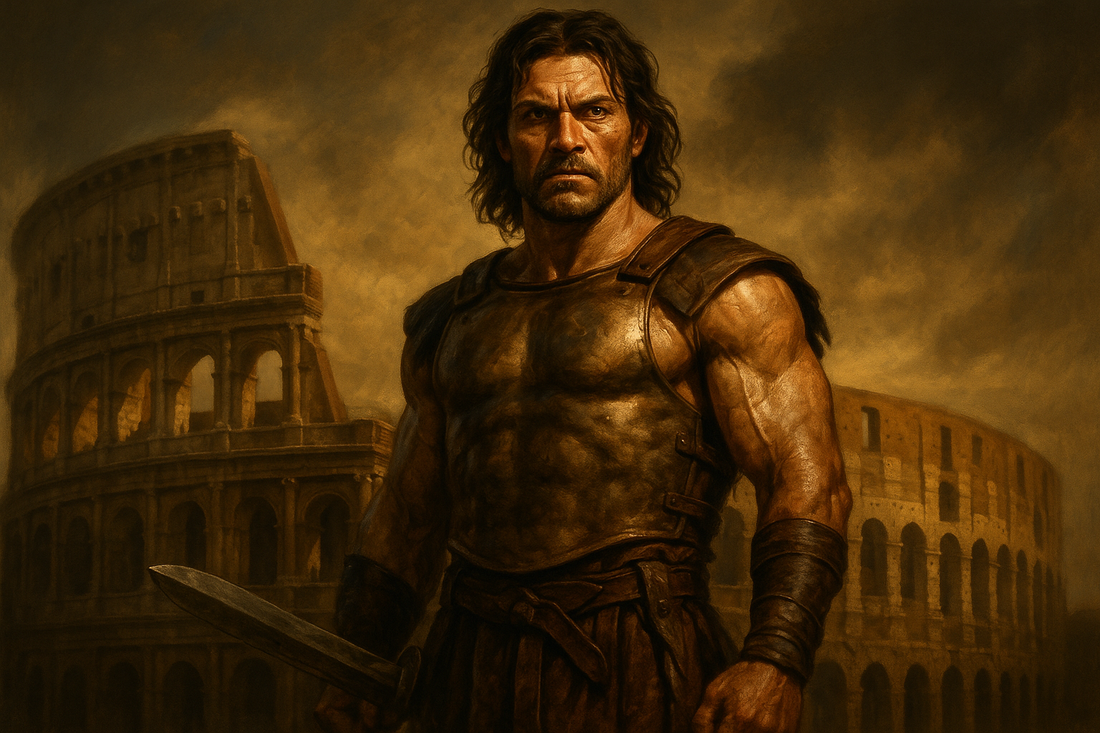
Spartacus: The Gladiator Who Defied an Empire
In the dusty arenas of ancient Rome, where death was entertainment and freedom was a distant dream, one man rose from the ranks of the enslaved to challenge the mightiest empire in history. Spartacus, a Thracian gladiator, transformed from a captive warrior into the leader of the largest slave rebellion Rome had ever faced. His story of courage, leadership, and the fight for freedom resonates powerfully with the warrior spirit we honor today.
From Warrior to Slave to Legend
Spartacus was born around 111 BC in Thrace, a region known for producing fierce warriors. Originally a soldier, he was captured and enslaved, eventually ending up in the gladiatorial school of Lentulus Batiatus in Capua. Here, he was trained to fight and die for the entertainment of Roman crowds.
But Spartacus possessed something his captors hadn't counted on – the unbreakable spirit of a true warrior. Unlike many who accepted their fate, he never stopped believing in the possibility of freedom, not just for himself, but for all who suffered under the yoke of slavery.
The Spark of Rebellion
In 73 BC, Spartacus and approximately 70 fellow gladiators made a decision that would shake the Roman Empire to its core. Armed with nothing but kitchen knives and an unquenchable desire for freedom, they broke out of their gladiatorial school and fled to Mount Vesuvius.
What started as a desperate escape quickly transformed into something far greater. Spartacus's natural leadership abilities and tactical brilliance began to attract thousands of escaped slaves, deserters, and oppressed people from across the Italian peninsula.
Military Genius Against Impossible Odds
What made Spartacus truly legendary wasn't just his courage, but his exceptional military leadership:
- Strategic Brilliance: He transformed a ragtag group of escaped slaves into a disciplined army of over 100,000 fighters
- Tactical Innovation: He repeatedly outmaneuvered Roman legions using guerrilla warfare and superior knowledge of the terrain
- Inspirational Leadership: He united people from different backgrounds under a common cause – the fight for freedom
His army defeated multiple Roman forces, including experienced praetors and their legions. For two years, Spartacus and his followers controlled large portions of southern Italy, striking fear into the heart of Rome itself.
The Warrior's Code in Action
Spartacus embodied the qualities that define true warriors throughout history:
- Fighting for Others: He could have escaped to freedom multiple times but chose to stay and fight for his followers
- Honor in Battle: Even Roman historians acknowledged his fair treatment of prisoners and civilians
- Leading from the Front: He fought alongside his men, sharing their dangers and hardships
- Never Surrendering: Even when facing certain defeat, he refused to abandon his principles
The Final Stand
In 71 BC, the Roman Senate finally took the rebellion seriously, sending Marcus Licinius Crassus with eight legions to end the uprising. Trapped in southern Italy and facing overwhelming odds, Spartacus made his final stand.
According to historical accounts, when offered terms for surrender, Spartacus refused. He would rather die fighting for freedom than live in chains. In the final battle, he fought with legendary ferocity, cutting down Roman soldiers as he tried to reach Crassus himself. Though his body was never found among the dead, his spirit of resistance lived on.
Legacy of Courage
Spartacus's rebellion sent shockwaves through the Roman Empire that lasted for generations. More importantly, his story became a symbol of the fight against oppression and the power of ordinary people to challenge seemingly insurmountable odds.
His legacy teaches us that:
- Freedom is Worth Fighting For: Some things are more valuable than life itself
- Leadership Means Service: True leaders sacrifice for their followers, not the other way around
- Unity Creates Strength: Diverse groups can achieve incredible things when united by a common purpose
- Courage is Contagious: One person's bravery can inspire thousands to action
The Modern Spartacus Spirit
Today, we see the spirit of Spartacus in those who serve and protect others – our veterans who fight for freedom in distant lands, our first responders who battle danger to keep communities safe, and our caregivers who struggle against illness and suffering.
Like Spartacus, these modern warriors often face overwhelming odds. They understand that some battles must be fought not because victory is certain, but because the cause is just. They know that true strength comes not from individual prowess, but from standing together with those who share their values.
Honoring the Warrior Within
Spartacus reminds us that the warrior spirit isn't defined by the arena in which we fight, but by our willingness to stand up for what's right, even when the odds are against us. His story resonates with anyone who has ever felt powerless but refused to give up hope.
At Zen Ops HQ™, we honor this tradition of courage and resistance. Just as Spartacus fought for the freedom of the oppressed, we support those who dedicate their lives to serving and protecting others. His legacy lives on in every person who chooses to fight for something greater than themselves.
The gladiator who became a legend teaches us that true victory isn't always measured in battles won, but in the courage to stand for our principles and the inspiration we provide to others. In that sense, Spartacus achieved the greatest victory of all – immortality through the power of his example.
Though Spartacus fell in battle over 2,000 years ago, his name still echoes through history as a symbol of courage, freedom, and the unbreakable human spirit. His story reminds us that even in our darkest moments, we have the power to choose how we face our challenges – with dignity, courage, and an unwavering commitment to what we believe is right.

